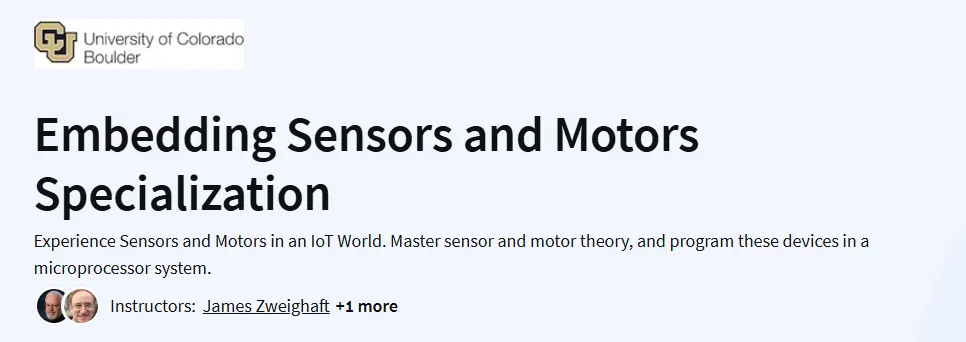Embedding Sensors and Motors Specialization
A comprehensive specialization that empowers learners to master the integration of sensors and motors into embedded systems, blending theory with practical application.
What will you learn in this Embedding Sensors and Motors Specialization Course
Understand sensor and motor theory and how to program these devices in a microprocessor system.
Implement sensors into embedded systems in both hardware and software.
Modify existing hardware schematics to add sensors and support circuitry.
Create hardware and firmware to process sensor signals and feed data to a microprocessor for evaluation.
Program Overview
1. Sensors and Sensor Circuit Design
⏳ Duration: 25 hours
Learn to specify and implement thermal, flow, or rotary sensors into embedded systems using the Cypress PSoC development kit.
2. Motors and Motor Control Circuits
⏳ Duration: 36 hours
Understand how to specify AC or DC motors for machine designs and integrate them into motor control circuits in both hardware and software.
3. Pressure, Force, Motion, and Humidity Sensors
⏳ Duration: 23 hours
Choose appropriate sensors for applications and design them into embedded circuits, focusing on pressure, force, strain, position, motion, acceleration, occupancy, and humidity sensors.
4. Sensor Manufacturing and Process Control
⏳ Duration: 55 hours
Explore sensor manufacturing methods, characterize and calibrate sensors, and tune PID control loops using the Cypress PSoC development kit.
Get certificate
Job Outlook
Equips learners for roles such as Embedded Systems Engineer, IoT Developer, and Automation Engineer.
Applicable in industries like manufacturing, automotive, healthcare, and consumer electronics where embedded systems are integral.
Provides practical experience with sensors and motors, enhancing employability in hardware and firmware development roles.
Supports career advancement in fields requiring expertise in embedded system integration and process control
- Taught by experienced instructors from the University of Colorado Boulder.
- Hands-on projects reinforce learning and provide practical experience.
- Flexible schedule suitable for working professionals.
- Provides a shareable certificate upon completion
- Requires prior experience with electrical or mechanical engineering concepts.
- Some advanced topics may be challenging without a strong background in circuit design and analysis.
Specification: Embedding Sensors and Motors Specialization
|
FAQs
- Some familiarity with circuits or mechanical systems is helpful but not mandatory.
- The course introduces sensor and motor theory gradually.
- Practical exercises help bridge knowledge gaps.
- Hands-on projects demonstrate real-world applications.
- Supports learners in developing practical embedded system skills.
- Teaches integration of sensors into embedded systems.
- Covers motor selection and control circuit implementation.
- Provides guidance on designing and modifying hardware schematics.
- Includes firmware programming for sensor signal processing.
- Prepares learners to implement complete embedded solutions.
- Practical exercises with Cypress PSoC development kit.
- Circuit design projects for sensors and motors.
- Programming exercises to process sensor data.
- PID control loop tuning and calibration practice.
- Reinforces theoretical knowledge through real-world tasks.
- Prepares for roles such as Embedded Systems Engineer and IoT Developer.
- Relevant for Automation Engineer positions.
- Applicable in manufacturing, automotive, and healthcare industries.
- Enhances employability in hardware and firmware development.
- Builds credibility for project-based and professional applications.
- Lifetime access to all course materials.
- Self-paced learning with flexible scheduling.
- Lessons and exercises can be repeated for mastery.
- Encourages iterative learning through projects.
- Supports long-term understanding of embedded systems integration.





